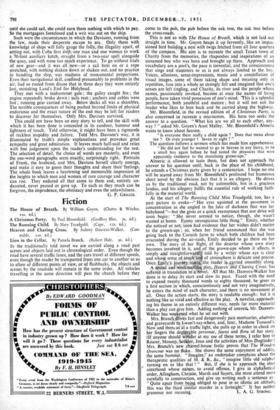Fiction
Lion in the Cellar. By Pamela Branch. (Robert Hale. 9s. 6d.)
IN the traditionally told novel we are carried along a road past scenes and objects laid out in chronological order. Even though the road have several traffic lanes, and the cars travel at different speeds, even though the reader be transported from one car to another so as to allow of different points of view, or of flashbacks, the objects and scenes by the roadside will remain in the same order. All vehicles travelling in the same direction will pass the church before they come to the pub, the pub before the oak tree, the oak tree before the cross-roads. _ _ This is not so with The House of Breath, which is not laid out straight in time. Mr. Goyen heaps it up fervently, like an impas- sioned bird building a nest with twigs fetched from all four quarters of the compass. His aim is to recreate the small Texan town of Charity from the memories, the rhapsodies and inspirations of an unnamed boy who was born and brought up there. Approach and vocabulary are a poet's, the pace is torrential, and the consciousness that sings and stammers to us is not always limited to the boy. Voices, allusions, sense-impressions, music and a constellation of visual images, some of them taking shape and meaning only in repetition, fuse into a whole So strongly felt and imagined that one's senses are left tingling, and Charity, its river and the people whose names, passionately invoked, become at once the names of living people, have taken vivid possession of one's mind. 'This is a splendid performance, both youthful and mature ; but it will not suit the reader who likes to lean back and be carried along the highway.
Mr. Bloomfield,_in the revised edition of A' Christmas Party, is also concerned to -recreate a microcosm. His hero too seeks the answer to a question. "What kin are we all to each other, any- way ? "asked Mr. Goyen's Aunt Malley. Mr. Bloomfield's Almeric wants to know about heaven.
"Is everyone there really a child again ? Does that mean about ten ? Or even younger ? Seven or eight ? "
The question follows a sermon which has made him apprehensive. " He did not feel he wanted to go to heaven in any burry, to be a small boy again before he had tasted the pleasures that were apparently exclusive to the moralising grown-ups."
Almeric is allowed to taste them, but does not approach the answer to his question until, back in the place of his childhood, he attends a Christmas party given by a centenarian. I hope no one will be scared away from Mr. Bloomfield's profound but humorous short novel by the obvious fact that it is an allegory. He drives us by the traditional road, not by automobile, but in a gracious landau, and his allegory fulfils the essential rule of working faith- fully in the material world.
At the start of The Running Child Miss Treadgold, too, has a past picture to evoke—" Her eyes squinted at the pavement in concentration as she angled in the lake of darkness that was her babyhood "—but she dives us a quick reassurance that our drive will soon begin : ' "She never seemed to notice, though, she wasn't wanted at home. Eunny unsuspicious little thing." Emily, whether she noticed or not, 'idol' had evidence that her wishes didn't matter to the grown-ups; so, when her friend announced that she was going back to the Cornish farm to which both children had been evacuated during the air-raids, Emily decided to go there on her own. The story of her flight, of the deserter whose own story becomes involved.in it, and .of the grown-ups whom it affects, is simply- ,and straightforward told by a writer whose eye is clear and whose sense of touch a of atmosphere is delicate and precise. Once Eynily's journey starts, the 'leader '4,fArried smoothly along. A sound and workmanlike play, Heaven Itidd Charing Cross, has suffered in translation to a 'hovel. All that Mr. Danvers-Walker has done is to delay its start and slow its pace. Faced with the need to expand twenty thousand words to eighty thousand, he gives us a first section in which, conscientiously and not very imaginatively, he enters the mind of each character, and there is no movement at all. Once the action starts, the story is readable enough:- but it is nothing like as vivid and effective as the play. A novelist;approach- ing his theme in an entirely different way, needs far more material than a play can give him. Adding nothing of interest, Mr. Danvers- Walker has weakened what he set out with.
Mrs. Branch drives fast and dangerously past mortuaries, abattoirs and graveyards to I-won't-say-where, and, later, Madame Tussaud's. Now and thenv as at a traffic light, she pulls up in order to check on her fingers the depW4ble personae fauna and flora of her story. (If anyone should ivbaer at my use of these terms, I refer him to Roarer, Mossop, Setktor, Joan and the activities of Miss Dogtinder.) Mrs. Branch's new charnel-house frolic proves that- The Wooden Overcoat was no fluke. She shows the same enjoyment of oddity, the same humour. "Imagine,'-' an undertaker complains about the therapeutic qualities of M. & B., &c., "imagine little old sulphur turning on us like that ! " But, if she is to approach the elect sisterhood whose names, to avoid offence, I give in alphabetical order, Allingham, Christie, Marsh and Sayers, she must attend more carefully to construction, and give up writing such a sentence as: "Quite apast from bein_g obliged to pose in so idiotic an attitude, this was the third -sialar murder in a fortnight." It has neither


















































 Previous page
Previous page